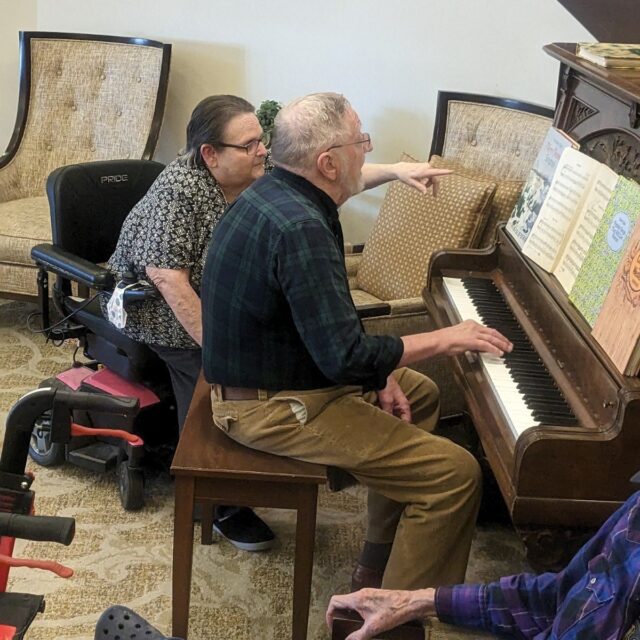A simple act of kindness and sharing a talent can bring new life and joy to residents at an assisted living home. This was the case when a senior resident decided to give a piano lesson to another senior resident here at Ralston Creek Neighborhood. Neighbors helping neighbors. This piano lesson was a perfect example of how sharing one’s talent and passion can bring joy and purpose to both the giver and the receiver. It is a reminder that we are never too old to learn or teach, and that a shared love of music can bring people together regardless of age or ability.
Being part of a senior community can provide a powerful sense of belonging and support for older adults. As people age, they may experience changes in their living situations, social networks, and physical health, which can lead to feelings of isolation and loneliness. Senior communities offer a solution to this problem by creating a supportive and inclusive environment where residents can form meaningful connections with others who share similar interests and experiences. By participating in community events, engaging in conversation with neighbors, and taking advantage of the various amenities available, seniors can build strong relationships and feel a sense of belonging which can be invaluable in the later stages of life.
Opportunity
An assisted living community can offer amazing socialization opportunities for older adults looking to connect with others in their age group, like these residents did. These communities are designed to provide a safe and comfortable environment where seniors can live as independently as possible while still having access to a range of social activities and amenities. From organized group events like movie nights, game nights, and fitness classes, to casual gatherings in communal areas, there are plenty of opportunities to meet and interact with other residents. This can be especially beneficial for older adults who may be experiencing loneliness or isolation, as socialization has been shown to have positive effects on mental health and overall well-being. Additionally, being part of a senior community can provide a sense of belonging and support, which can be invaluable in the later stages of life.
Socialization can be incredibly beneficial for seniors with memory deficits such as Alzheimer’s disease or dementia. Engaging in social activities can help stimulate the brain, keeping it active and sharp. Studies have shown that regular socialization can help slow down cognitive decline and even delay the onset of dementia. Socialization can also help with memory retention by providing opportunities for seniors to engage in conversation, reminisce about past experiences, and form new memories. Socializing with others can improve the overall quality of life for seniors with memory deficits, reducing feelings of isolation, depression, and anxiety. By interacting with others and participating in group activities, seniors can maintain a sense of purpose, identity, and connection to the world around them, which can be incredibly beneficial for their overall well-being.
The heartwarming story of our resident at Ralston Creek Neighborhood giving a piano lesson to another resident highlights the importance of fostering social opportunities for older adults. Senior communities can offer a variety of activities and amenities that allow residents to connect with one another and form meaningful relationships. From organized events to casual gatherings, these opportunities for socialization can have a positive impact on mental health and overall well-being, particularly for those with memory deficits such as Alzheimer’s disease or dementia. By providing a sense of belonging and support, a senior community can enhance the quality of life for older adults, promoting greater independence, happiness, and fulfillment.


